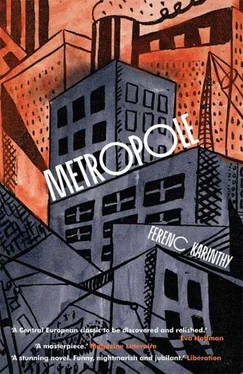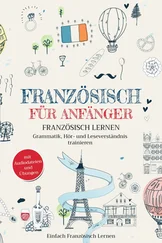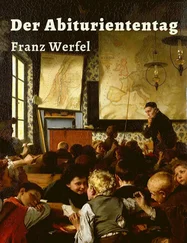And so he stubbornly stood guard and would not let his victim go, eventually triumphing by sheer will: she put aside her mysterious frustrations and, ready to help again, started reading the list he placed in front of her, one item after another in a loud clear voice… For the first time perhaps since arriving in the city Budai felt he had achieved something by the power of logic. There were various signs of this, such as Tete’s facial expression and her gestures. He began to work out the meanings of individual words and groups of words. He was on the right track. In tiny ways he began to feel that the situation was not entirely hopeless. He redoubled his efforts, grasping every opportunity, almost enjoying the way the girl rolled off the list, repeating each word after her so that his ears and lips might retain the sound.
The trouble with the internationally-used words, he was disappointed to note, was that none of them was in, or even resembled, the forms he expected. Everything from taxi, bus, metro, hotel, buffet, orange, banana through to cocoa had a different name. What this suggested was that the people here — meaning particularly the linguists, the scholars and the press — must have been pretty fierce in their defence of the purity of the language against foreign influence. Or could it be that they were so isolated from the other peoples of the earth that there could be no question of influence at all?
He now had a store of some thirty to forty words and phrases, each with its pronunciation clearly noted along with its meaning and some possible options in cases of doubt. Even he was surprised how nicely all this rounded up. He whistled cheerfully as he rearranged his bits of paper, every so often with a glass of that sweet alcoholic drink. He decided not to seek out further material for now, preferring to make a thorough study of what he already had.
All the same, next morning he tried to persuade the girl to break his words down into signs and sounds, or at least to divide the most common phrases into individual words but this, to his surprise, proved a failure: they stumbled, started again and stumbled once more. The individual letters sounded different each time, now longer, now shorter, sometimes lacking any resemblance. Despite repeated questioning he got no better, no more coherent answers, quite the converse, in fact, for the longer he went on the more confusing it became. Maybe each sign was capable of being pronounced in a variety of ways depending on context, on the surrounding letters, syllables or words. Didn’t this happen in English and French? Or, to reverse the argument, might it be possible that a single sound was represented by a variety of signs?
Of course all these analogies only worked if their characters actually represented letters, not syllables — which thought led him to consider the further problematic possibility that they represented entire words, as in Chinese, where characters stood for concepts. He didn’t think that was very likely since Chinese characters tended to look more like pictures and involved more calligraphic marks than this script did and, more importantly, tended to express their contents more concisely. But in so far as they represented syllables they demanded a different approach since syllables tended to consist of a consonant and a vowel and if he happened to discover, say, the syllable, pe, he still wouldn’t be able to work out which was p and which was e. That was because in such a system there would be one character for pe and another for, say, pi, pa, po, as much as for me, re, j, etc., in other words, the two sounds he was looking for would be hidden inside other syllabic characters. And should there be three-, four- or five-letter syllables what would be the connecting thread that might help identify them?
But if he made little progress with assigning sound or meaning to letters he did at least recognise the characters and the rough appearance of a range of phrases. It was a shame that these were, by and large, of peripheral importance, of no great value in everyday conversation and conduct. More to the point there were still too few to help him achieve the object of getting home. It was therefore necessary to continue collecting from an ever wider area.
He went on to street names. Strange he hadn’t thought of this earlier. It looked like a well-planned city with street names clearly displayed on every corner, the format uniform on brick-shaped yellow boards with uniform black letters. Budai looked for common elements between them, words or clusters that would mean road, street, avenue, boulevard, alley, passage, ring, terrace and so forth. But however he looked he found no common terms. Could it be that they did not bother to provide such terms because they thought them redundant? Or maybe they employed the kind of name that did not need a qualifier, such as the Strand and Piccadilly in London, Broadway and the Bowery in New York, Rond-Point in Paris, the Graben in Vienna, and the Körönd or the old Oktogon in Budapest. These were exceptions in their cities but could this kind of name be the norm here?
He fared somewhat better with the advertisements, those on the steps of the metro, along its corridors, in the underground halls and on posters everywhere in the street, some of them enormous, filling entire walls. There were many he was sick to death of seeing: the blond pink-skinned man and the fat black cook who winked and bared her brilliant white teeth while lifting a serving spoon high in the air, the knight-in-armour with an umbrella raised above his head, the big family group sitting in a circle soaking their feet in a large common bowl and all the rest, though he didn’t see any advertisements for goods and services generally available in Europe. The problem with the wall-mounted posters was that it was very difficult to tell the brand-name from the actual product. For example if he read Ship Soda he wouldn’t know which was Ship and which was Soda. Nevertheless, he did manage to identify a few new terms such as washing-powder, tyres, laxative, cigarette-holder, lawnmower, stock-cube. Not that these were of any practical use to him.
There were a great many visual signs or icons intended to take the place of written instructions — pointing fingers, various diagrammatic figures, a number of silhouettes. The washrooms in the hotel displayed a bath or shower icon, the toilets a male or female head or alternatively men’s or women’s shoes. Telephone booths carried no text, only a simplified drawing of a telephone. If smoking was forbidden a smoking pipe was displayed with a red line through it, the red line being a feature of all notices forbidding something. Traffic signs too, he discovered, were of much the same kind as anywhere else and the directional signs in the metro were similarly reduced to their essence through colours and arrows. All these signs were of help in coping with everyday circumstances but it did not mean Budai was able to read the language. They simply enabled him to orientate himself and to conduct a fairly limited range of activities. At the same time, standing in as they did for written notices, such signs were merely a barrier to fuller understanding.
And then it occurred to him that when he was seeking the edges of town there had been an illuminated doorway glimmering through the fog but that he had hurried on and hadn’t taken a closer look at it. Might it have been a cinema? And even before that, on that first Sunday when he was walking through the downtown area that he had happened to wander into, were there variety theatres or cinemas among them?… He couldn’t recall. He hadn’t cared then but now it bothered him. He wondered whether to go back, whether it would be worth the effort and expense. His stock of cash was so low he resented spending it even on the metro. He didn’t dare think what would happen if it ran out. Should he try locating the building? He had had so many disappointments since arriving here was it worth risking another? It might be better to wipe the thing from his memory, to let it go hang and pretend he hadn’t noticed anything.
Читать дальше












